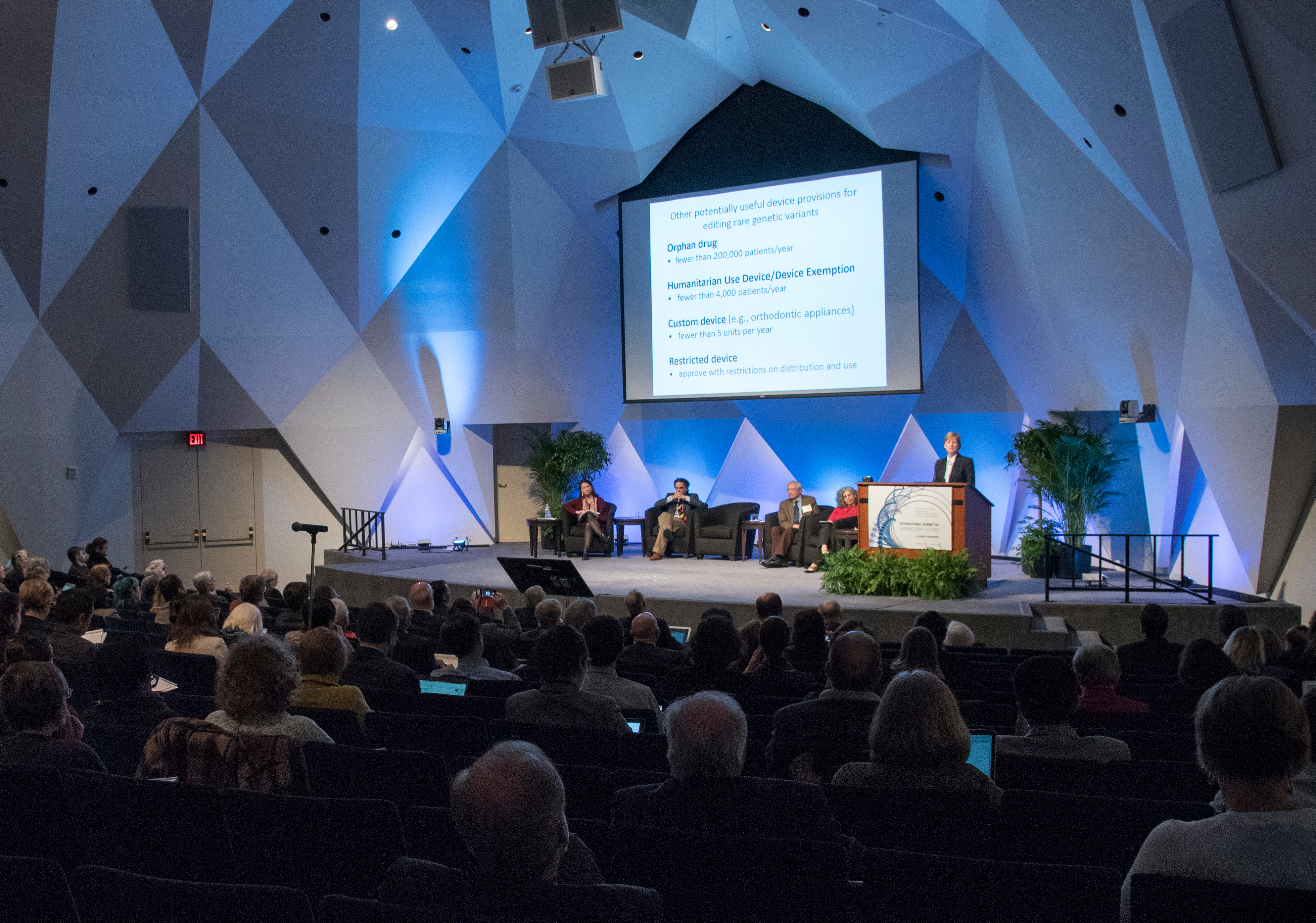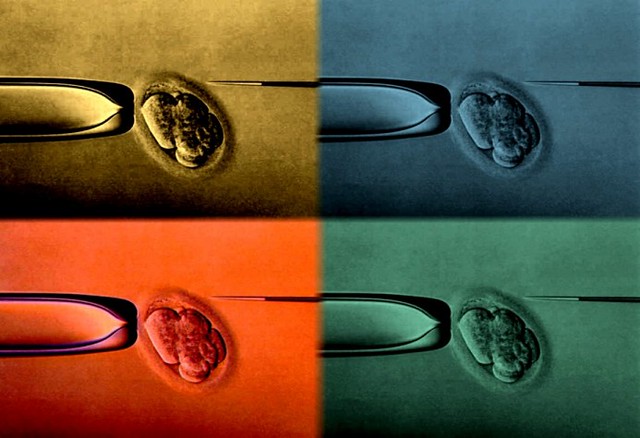News
Human genome modification: tenuous safeguards

From March 6 to 8, 2023, the third International Summit on “Human Genome Editing” was held in London at the Francis Crick Institute. It was an opportunity to “discuss the progress, promise and challenges of research, regulation and equitable development of human genome editing technologies and therapies”, as stated in the declaration drawn up by the organizing committee and published at the end of the Summit. We are therefore well and truly in an exercise of social acceptability of genetic modifications of the human genome.
The third international summit devoted to “human genome editing” was not intended to question these techniques but to “frame” them [1]. The members of the International Coalition « Stop Designer Babies » were present in London in early March to “try to influence the outcome of the Summit and make sure that the voices of those who are not being heard in these debates are heard” [2].
The Summit organising committee was pleased with the quality of the presentations and discussions. The International Coalition “Stop Designer Babies”, on the other hand, considers that the Summit “was very disappointing in many respects, especially because of the lack of concrete discussion of the values and social meaning of this technology of human genetic modification”. This article proposes to decipher the statement issued at the end of the summit[“Statement from the Organising Committee of the Third International Summit on Human Genome Editing”, March 8, 2023]]. Like the activists, we will see that the Summit effectively remained in the “how to” and asked very little about the “why”.
A disturbing context
Let’s begin by situating this Summit. For the Coalition, it is not insignificant that it was held at the Francis Crick Institute in London. Indeed, in an article entitled “Don’t mention the war!” [3], the Coalition reminds us that “the choice of venue (…) is both appropriate and disturbing. Is it not appropriate that a process which many people regard as the culmination of 140-year agenda of eugenics should be held at a venue named after a famous British eugenicist? » The Coalition supports this claim with quotes from Francis Crick:”My other suggestion is in an attempt to solve the problem of irresponsible people and especially those who are poorly endowed genetically having large numbers of unnecessary children. Because of their irresponsibility, it seems to me that for them, sterilization is the only answer and I would do this by bribery [4]“. Or: “No newborn child should be recognized as human until it has passed a number of tests of its genetic endowment. If he does not pass these tests, he loses his right to life”. [5].
Similarly, the Coalition explains that one of the leader of this Summit, Robin Lovell-Badge, frequents the British Eugenics Society and, as the head of the British Fertility and Embryology Authority, he advocates “overturn the global consensus banning genetic modification of human beings (HGM) [6].
But let’s go back to the statement issued at the end of the Summit. It begins by noting that “remarkable progress has been made in the field of somatic human genome editing, demonstrating that it can cure previously incurable diseases” and in particular that “the dramatic improvement in CRISPR-based research interventions for sickle cell disease gives hope to patients”. The organizing committee therefore calls for broadening the spectrum of diseases to be treated.
Frame gene therapies
But some good-natured caution is desired by the organizers and stakeholders. The statement emphasizes that “extended long-term follow-up is essential to fully understand the consequences of an edit and to identify any unanticipated effects, should they occur”. Is the precaution provided simply possible in the face of the increasing number of clinical trials underway? We have already moved into practice, leaving basic science far behind. The desire for “long-term follow-up” requires, de facto, a suspension of the myriad of somatic cell modification trials already scheduled.
The question of the supervision of these techniques of genetic modification of embryos was one of the aspects of this Summit with, in particular, an initial discussion of the recently updated guidelines in China. It was noted that the Chinese measures do not address privately funded research [7]. It was also stated that many countries, including the U.S., do not have sufficiently robust regulatory frameworks to prevent a repeat of the 2018 scandal.“ [8]. The scandal mentioned is the one announced at the previous edition of this Summit, held in Hong Kong in 2018: the birth of genetically modified babies in China [9].
The researchers present also seem to agree on a red line: it is possible to modify somatic cells, that is, cells whose DNA is not transmitted to descendants, but not germ cells, gametes (eggs, sperm, for example). But this “red line” is not fixed. Thus, the organizing committee, in its previously mentioned press release, writes that “Heritable human genome editing remains unacceptable at this time”. Indeed, it is just a matter of prohibiting them while “Governance frameworks and ethical principles for the responsible use of heritable human genome editing are not in place », and the safety of these interventions is improved. Is this possible? Later, the authors return to this point and state that”heritable human genome editing should not be used unless, at a minimum, it meets reasonable standards of safety and efficacy, is legally sanctioned, and has been developed and tested under a rigorous oversight system subject to responsible governance. At present, these conditions are not met“. It is therefore only a question of supervising innovations and not of respecting ethical principles. This is worrisome since the consequences of these innovations cannot be predicted.
In concrete terms, there would be a “legitimate research” and another one done by “unresponsible” institutes. The same dichotomy often comes up in relation to dangerous technologies, such as nuclear power, which is to be encouraged in France but curbed in Iran. Who proves to us that France will remain a democracy? Who can say who is legitimate or not, what research is relevant or not, what disease can be treated, etc.?
The press release returns, a few paragraphs later, to “the editing of the human germline genome for research”. It is then no longer a question of prohibiting but on the contrary of encouraging fundamental research. A nice trick. The text states that “Basic research using genome editing in human embryos has continued, with the aim of either understanding aspects of early human development or exploring how the methods might be used to correct gene variants leading to genetic disorders. There has also been significant progress in basic research on deriving functional gametes from stem cells”. This discourse was already the one at work during the revision of the bioethics law, in France [10]. Basic research in this area should continue. What is the difference between modifying the human germline and the heritable human genome? The statement provides the answer in a note: “germline human genome editing refers to the editing of human embryos or gametes in a research setting, with no plans for those embryos or gametes to be used for human reproduction. Heritable human genome editing refers to the editing of human embryos or gametes to be used for human reproduction”. The difference as specified in this statement is tenuous…
Exorbitant costs
On the other hand, the rhetoric of precision also came up again and again in the debates. For example, the Organizing Committee’s press release notes that “improved techniques have enhanced the efficiency, precision, and accuracy of the editing process, yet effective delivery and editing remains difficult for many tissues of the body”. This nuance, which is required in communications, does not, however, call into question the belief in the endless progress of these techniques. It is simply a question of time and therefore of money…
On the subject of money, this Summit discussed the cost of these therapies and the inequality that they can generate. This theme comes up twice in the declaration. Considering that “The extremely high costs of current somatic gene therapies are unsustainable”, the organizing committee calls for “a global commitment to affordable, equitable access to these treatments is urgently needed”. Then, near the end of the text, the authors point out that “In many cases, costs and infrastructure needs of current gene therapy treatments are not manageable for either patients or healthcare systems. Correcting this will require appropriate planning from the earliest stages of the research and development for each potential application.” The idea of appropriate planning is rather obscure. Who plans what? Who will pay? The answer provided by this release is overall puzzling: “Health care systems and the global health community should prepare to provide patients with cost-effective, affordable, proven therapies. Therapies based on somatic genome editing that could help meet these needs should be a priority for research investment.”
Few articles have actually been published on this event. One of them, written by two researchers from the Rochester Institute of Technology, and published in The Conversation[[The Conservation, ibid.], proposes, in conclusion, a Manichean and reductive view of the debate. For them, the debate over the use of these technologies is between those who “equate genome editing to interfering with the work of God” and those who “recognize its potential value and weigh that against its potential risks. ”.
[1] The term “genome editing” is not legally defined. It is in fact genetic modification, in the same way as transgenesis, but with other molecular tools.
[2] International Coalition Stop Designer Babies, “Help us change the narrative after the International Summit on Human Genome Editing”, 9 March 2023
[3] Coalition Stop Designer Babies, March 5, 2023
[4] This quote is from a letter from Crick to Dr. B. Davis (Harvard Medical School), sent in 1970: https://collections.nlm.nih.gov/ocr/nlm:nlmuid-101584582X211-doc
[5] Pierre Thuillier, La recherche, n°155, May 1984
[6] The Coalition specifies:”In 1999, [… ] the mask slipped and it invited three hard-core scientific racists to speak at its annual conference: Arthur Jensen, whose notorious 1968 article in the Harvard Educational Review, claiming that the IQ gap between African Americans and white Americans was largely genetic and therefore unfixable; Richard Lynn, the modern doyen of IQ and race theorists, who has for the last 20 years, been the administrator of the far right Pioneer Fund, known for funding IQ genetics research and various far right and racist causes and individuals; and Glayde Whitney, who was expelled as chair of the International Behavioural Genetics Association after racist remarks and who subsequently wrote an admiring forward to a book by David Duke, leader of the Ku Klux Klan. »
[7] Megan Molteni, “At genome-editing summit, experts worry that rule changes on embryo research in China fall short”, Stat News, 6 March 2023.
[8] André O. Hudson, “Human genome editing offers tantalizing possibilities – but without clear guidelines, many ethical questions still remain”, The Conversation, March 8, 2023.
[9] , « Bébés OGM en Chine : le chercheur en prison mais après ? », Inf’OGM, 7 January 2020.
[10] , « Bioéthique et esprit de la loi : des garde-fous bien fragiles », Inf’OGM, 29 July 2021.












